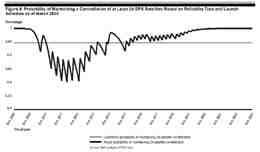 Older satellites will need to be replaced quickly if GPS is to maintain its precision.NASA
Older satellites will need to be replaced quickly if GPS is to maintain its precision.NASAPosted on 05/23/2009 9:11:58 PM PDT by neverdem
Updated online: 22 May 2009
 Older satellites will need to be replaced quickly if GPS is to maintain its precision.NASA
Older satellites will need to be replaced quickly if GPS is to maintain its precision.NASAConcern over the US Global Positioning System (GPS) stepped up a notch today after a senior official from the US government's congressional watchdog warned that the US Department of Defense faced substantial challenges meeting its space-programme commitments.
Scientists use GPS signals for everything from tracking bird migration to making fine-tuned measurements of sea level change. The precision and accuracy of such measurements depends on how many satellites a GPS receiver can detect, and on the satellite's relative positions in the sky.
But on 30 April, the Government Accountability Office (GAO) warned that new satellites might not be launched in time to replace the ageing constellation currently in orbit. And yesterday Cristina Chaplain, director of acquisition and sourcing for the GAO, testified before the Senate Committee on Armed Services that cost over-runs of defence department space programmes are part of the problem.
"It's not that people will suddenly not be able to use the system, but if you start to lose satellites then maybe the performance starts to degrade slightly," says Marek Ziebart, a space geodesy researcher at University College London.
“To measure sea levels reliably you want lots of satellites and you want them working well.”
Marek Ziebart
University College London
Two factors determine whether the GPS service can maintain its precision: the rate at which old satellites wear out and the rate at which the US Air Force can launch replacements. The GAO estimates that the chance that the GPS system will be able to provide full coverage could dip below 95% between 2010 and 2014, when the Air Force plans to begin replacing the current block of satellites with a newer generation.
There are 31 functional GPS satellites in orbit now, with only 24 needed to provide full coverage, but "the more the better" for many science applications, says Ziebart. "To measure sea levels reliably you want lots of satellites and you want them working well," he adds.
The United States has provided a free civilian GPS service since the 1980s, a decade before the completion of its first full 24-satellite constellation. Russia also reached a peak of 24 operational navigation satellites for GLONASS, its own global navigation satellite system, in the 1990s. Currently it has only 20 functional satellites but plans to launch more.
 Click for a larger image.GAO
Click for a larger image.GAO
The atomic clocks and reaction control wheels in the satellites are what are most likely to cause failures, says Richard Langley, a geodesy researcher at the University of New Brunswick in Fredericton, Canada. Satellites carry back-up components, says Langley, but time has already taken its toll on all but the last atomic clock on 18 US GPS navigation satellites, according to a recent unclassified US Air Force report.
"The United States has a couple more [older, hibernating satellites] that could be pressed into service if needed," say Langley.
Few satellite specialists think that the US system will cease to provide a useful service. "I don't think [scientists] should worry much about it," says Langley. Already, some GPS receivers can pick up signals from both US and Russian satellites. Scientists who work with GPS should "bear it in mind … and look at whether investing in GLONASS is right for them", he says. The smallest receivers, such as those used for wildlife tracking, rarely have the capability to pick up signals from both systems, although larger, more expensive systems do.
“GPS isn't falling out of the sky.”
Dave Buckman
US Air Force Space Command
And responding to questions on the US Air Force Space Command (AFSPC) Twitter feed, Colonel Dave Buckman, command lead for position, navigation and timing at the AFSPC, wrote that he agreed with the GAO "that there's a potential risk, but GPS isn't falling out of the sky — we have plans to mitigate risk and prevent a gap in coverage".
Because many surface-based GPS systems are replaced every few years anyway, any upgrade would be unlikely to disrupt operations much, says Ziebart. But the problem may be more serious for scientists who have to rely on existing equipment, such as low Earth-orbiting satellites including Jason-1 and Jason-2, which use GPS signals to establish their positions, and which cannot be upgraded so easily.
Signals from the GPS system are also used for numerous civilian operations, including financial transactions and aviation navigation. Some have questioned the wisdom of White House plans to deactivate in 2010 a land-based radio navigation system called LORAN, which could serve as a backup to GPS systems.
Although scientists may face a temporary decline in the accuracy of their GPS signals, Washington Ochieng, a navigation researcher at Imperial College London, says, "There's no way the United States is going to let GPS stop."
Richard Langley has created a table(pdf) showing how a shrinking GPS constellation might affect the reliability and strength of the GPS signal.
Thanks for the link.
Thanks!!!
Disclaimer: Opinions posted on Free Republic are those of the individual posters and do not necessarily represent the opinion of Free Republic or its management. All materials posted herein are protected by copyright law and the exemption for fair use of copyrighted works.